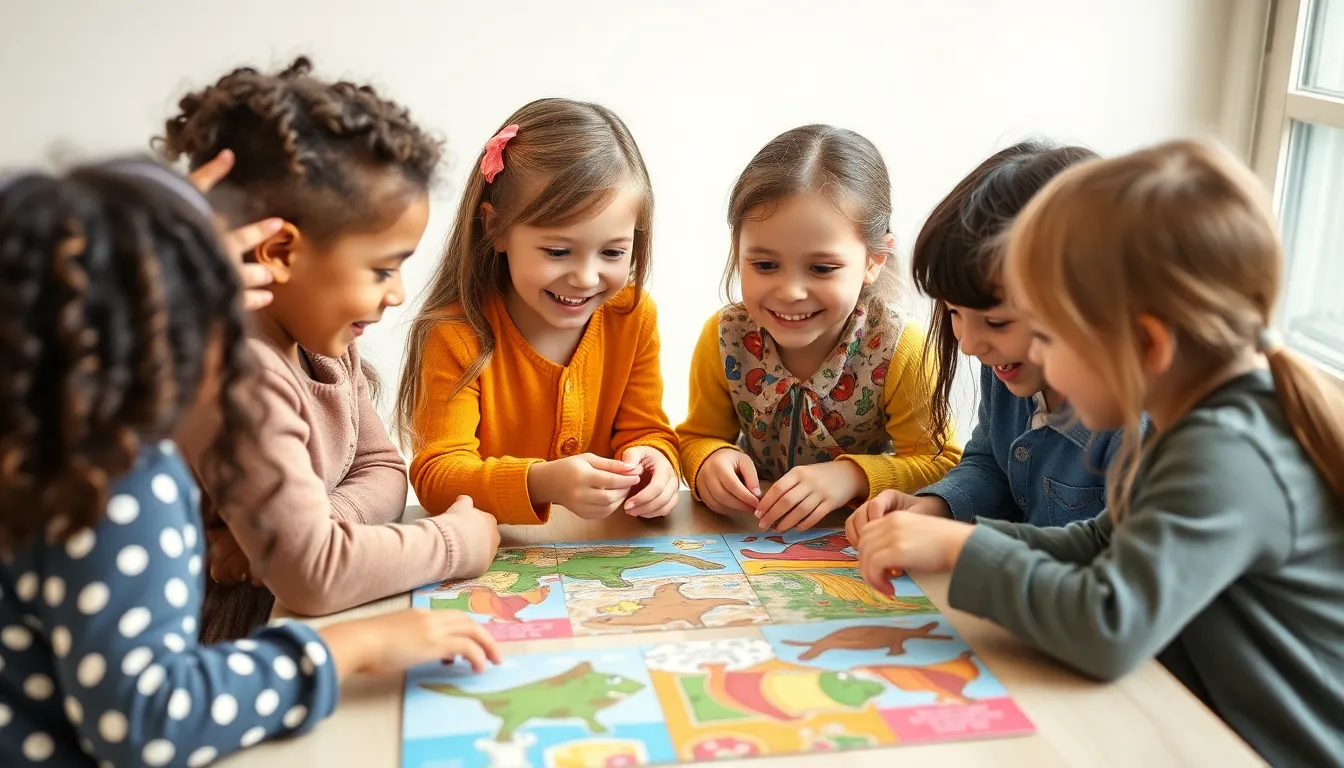Language development puzzles are like the Rubik’s Cube of childhood learning—colorful, complex, and often frustrating. As kids navigate the twists and turns of language, they encounter delightful challenges that spark curiosity and creativity. These puzzles don’t just enhance vocabulary; they build critical thinking skills and lay the foundation for effective communication.
Imagine a world where toddlers tackle tongue twisters while giggling, or preschoolers decode silly rhymes with the focus of a detective on a mission. The journey of language development is filled with laughter and lightbulb moments. By diving into these puzzles, children not only learn to express themselves but also discover the joy of words. So buckle up and get ready to explore how these engaging challenges can transform language learning into an exciting adventure.
Table of Contents
ToggleUnderstanding Language Development Puzzles
Language development puzzles serve as valuable tools for enhancing children’s communication skills. Engaging with these puzzles encourages toddlers and preschoolers to expand their vocabulary through hands-on activities. Critical thinking becomes second nature as children solve these complex language challenges.
Patterns in language also emerge as children sort and categorize words. Discovering new vocabulary through these interactive puzzles fosters creativity in expression. Children enjoy the process, associating learning with play.
In addition, social interaction occurs when children tackle puzzles together. Collaborating with peers builds teamwork and enhances conversation skills. The joy found in shared challenges strengthens friendships and communication.
Moreover, different types of puzzles cater to varying age groups, ensuring every child can participate. For instance, simple matching games introduce basic vocabulary while more advanced puzzles incorporate grammar elements. This versatility allows parents and educators to tailor experiences to individual learning levels.
Utilizing language development puzzles in educational settings promotes an active learning environment. Classrooms that incorporate these tools often see improved engagement and enthusiasm among students. Through enjoyable activities, children develop a strong foundation in language that benefits them in later academic pursuits.
Research supports the effectiveness of interactive learning methods in fostering language development. Engaging children in conversation, whether through puzzles or games, significantly boosts their language acquisition. Prioritizing these experiences can lead to lasting improvements in communication skills as children grow.
Types of Language Development Puzzles

Language development puzzles come in various forms, each tailored to enhance specific skills. The diversity of these puzzles allows for enriching learning experiences.
Cognitive Challenges
Cognitive challenges engage children’s problem-solving abilities. They focus on tasks that require critical thinking, such as matching words with pictures. Children learn to categorize vocabulary, improving their cognitive skills and memory retention. These puzzles often involve sequencing events or identifying synonyms and antonyms. As children tackle these challenges, their brain development accelerates, fostering a deeper understanding of language. Research indicates that cognitive challenges lead to significant improvements in language retention and usage, making them essential tools in early education.
Social Interaction Challenges
Social interaction challenges encourage collaborative play among peers. These puzzles promote teamwork as children work together to solve language-based tasks, enhancing their communication skills. Roles can rotate during group activities, allowing each child to contribute ideas and strategies. Engaging in these challenges cultivates sharing, negotiation, and active listening. Furthermore, social interaction challenges develop empathy and understanding as children learn to respect diverse viewpoints during discussions. Studies reveal that children who participate in collaborative puzzles experience a notable rise in social language skills, fostering strong relationships with their peers.
Importance of Solving Language Development Puzzles
Solving language development puzzles holds significant value for children’s growth. Engagement with these puzzles enhances vocabulary through direct interaction with words. Expanding language skills occurs as children identify and categorize terms within various contexts.
Critical thinking abilities improve when children tackle cognitive challenges. Tasks such as matching words with pictures or identifying synonyms push them to think deeply about language structure. Recognition of patterns in language comes with practice, further solidifying understanding and retention.
Collaborative social interaction is another benefit, as children often work together on language puzzles. Teamwork promotes effective communication, allowing kids to express thoughts and ideas while learning from each other. Empathy starts to develop as they learn to respect diverse viewpoints during these collaborative experiences.
Incorporating these puzzles into educational settings raises overall engagement levels. Active participation becomes more common, fueling a lasting enthusiasm for language learning. Research indicates that hands-on activities significantly improve language skills, suggesting that prioritizing these methods strengthens foundational communication abilities.
Different types of puzzles cater to unique age groups, ensuring an appropriate level of challenge. Tailored learning experiences maximize developmental benefits and keep children motivated. Prioritizing language development puzzles can transform language learning into an enjoyable journey, helping children flourish in their communication skills.
Strategies for Addressing Language Development Puzzles
Engaging children with language development puzzles involves incorporating interactive activities and utilizing supportive tools and resources. These strategies help enhance language skills while making the learning process enjoyable.
Engaging Activities
Interactive games form a fundamental aspect of language development puzzles. Matching games allow children to connect words with images, reinforcing vocabulary and comprehension. Story-building activities inspire creativity; children create narratives by arranging word cards. Singing songs aids in phonemic awareness, making learning fun and memorable. Group discussions encourage expressive language use, as children articulate their thoughts and ideas. Incorporating visual aids enhances engagement, helping children visualize concepts, fostering deeper understanding.
Supportive Tools and Resources
Educational apps provide accessible platforms for language practice. Many apps feature interactive exercises that adapt to children’s skill levels, making learning personalized. Flashcards serve as a traditional yet effective resource for reinforcing vocabulary and encouraging recall. Libraries offer a diverse selection of books that appeal to various interests, enhancing literacy skills. Teachers can utilize online resources to access lesson plans and activities tailored for language development. Community programs often host workshops that support language learning through games and collaboration.
Future Directions in Language Development Research
Emerging research trends focus on the interplay between technology and language development. Studies indicate that interactive apps and digital games engage children, enhancing their vocabulary in innovative ways. Incorporating technology into learning experiences expands access to resources, allowing for individualized learning paths.
Longitudinal studies are critical for understanding the long-term impact of language development puzzles. These studies track children’s language skills over time, providing insights into how early engagement influences later communication abilities. Notably, this approach helps identify which puzzles offer the most benefit at various developmental stages.
Collaboration between educators and researchers strengthens the effectiveness of language development tools. Sharing best practices enables schools to implement the most impactful methods, ensuring children receive the support they need. Peer-reviewed research emphasizes the importance of tailored approaches based on age and learning needs.
Investigating cultural influences adds another layer to language development research. Diverse language puzzles can reflect cultural contexts, promoting inclusivity and representation in language learning. This perspective fosters empathy and appreciation for different viewpoints among children.
Future research will likely explore the effectiveness of puzzle-based interventions in diverse educational settings. Evaluating outcomes in both traditional classrooms and community programs provides a broader understanding of language acquisition. These insights may lead to innovative practices that further enhance children’s communication skills.
Ultimately, the integration of research findings into practical applications represents a vital step in advancing language development. Fostering environments that encourage exploration and collaboration ensures that children thrive in their language learning journeys. Engaging with language puzzles not only benefits vocabulary growth but also nurtures critical thinking and social skills, preparing children for future communication challenges.
Language development puzzles are more than just fun activities; they’re essential tools that shape children’s communication abilities. These engaging challenges not only boost vocabulary but also cultivate critical thinking and social skills. As children navigate through puzzles they learn to recognize patterns and collaborate with peers, fostering a sense of teamwork and empathy.
Incorporating these puzzles into educational settings creates vibrant learning environments where curiosity flourishes. The blend of cognitive and social interaction challenges ensures that each child can find a suitable approach to language learning. With ongoing research and innovation in this field, the future looks bright for enhancing language skills through interactive and inclusive methods. Embracing language development puzzles paves the way for children to thrive in their communication journeys.



